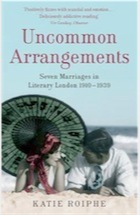 You would think that a book about marriages within the Bloomsbury group--the famous "circle of friends who lived in squares and loved in triangles"--would be interesting. Or I would think that anyway. At the very least the gossip should be good. So why was Uncommon Arrangements so boring for me?
You would think that a book about marriages within the Bloomsbury group--the famous "circle of friends who lived in squares and loved in triangles"--would be interesting. Or I would think that anyway. At the very least the gossip should be good. So why was Uncommon Arrangements so boring for me?I'm not hugely familiar with the work of the Bloomsbury group outside of Virginia Woolf--of whom I'm just not hugely fond--but I did visit Charleston a few years back and found the home, long inhabited by Vanessa Bell and Duncan Grant, beautiful and charming and fascinating. It's why I picked up this book. And my enjoyment of that place is also what made me particularly disappointed by how little I liked the book.
A large part of my issue is that I disliked the structure of the book. Each of the seven couples Roiphe discusses gets a chapter of roughly equal length, and these seven chapters are bookended by an introduction and a postscript. This means that roughly equal time is devoted to each couple even though some are a good bit more interesting than others. It also means that while certain people--Virginia Woolf, for one--flit through a number of the chapters, the central couple in each often feels divorced from their social and artistic milieu (two things that are, after all, not so different with from one another when it comes to the Bloomsbury group).
But more fatal still, for me, is the fact that while you'll finish Uncommon Arrangements with a good idea of how people like H.G. Wells and Vanessa Bell constructed their romantic relationships you won't be much the wiser when it comes to the connections between their work and their views on relationships. Roiphe writes with great insight about the feelings, the ideas, the negotiations, etc. that formed the seven relationships under consideration. But she has less to say about the work that keeps us interested in these people. Well, some of them anyway.
It's not particularly fair to judge a book on what you want it to be rather than what it intends to be. But I don't think fairness has much of anything to do with reading enjoyment. And while Roiphe no doubt succeeded on her own terms--by which I mean she examines the nature of marriage by looking at the unusual arrangements of these famous literary figures--Uncommon Arrangements isn't the book I wanted it to be.
But more fatal still, for me, is the fact that while you'll finish Uncommon Arrangements with a good idea of how people like H.G. Wells and Vanessa Bell constructed their romantic relationships you won't be much the wiser when it comes to the connections between their work and their views on relationships. Roiphe writes with great insight about the feelings, the ideas, the negotiations, etc. that formed the seven relationships under consideration. But she has less to say about the work that keeps us interested in these people. Well, some of them anyway.
It's not particularly fair to judge a book on what you want it to be rather than what it intends to be. But I don't think fairness has much of anything to do with reading enjoyment. And while Roiphe no doubt succeeded on her own terms--by which I mean she examines the nature of marriage by looking at the unusual arrangements of these famous literary figures--Uncommon Arrangements isn't the book I wanted it to be.
No comments:
Post a Comment